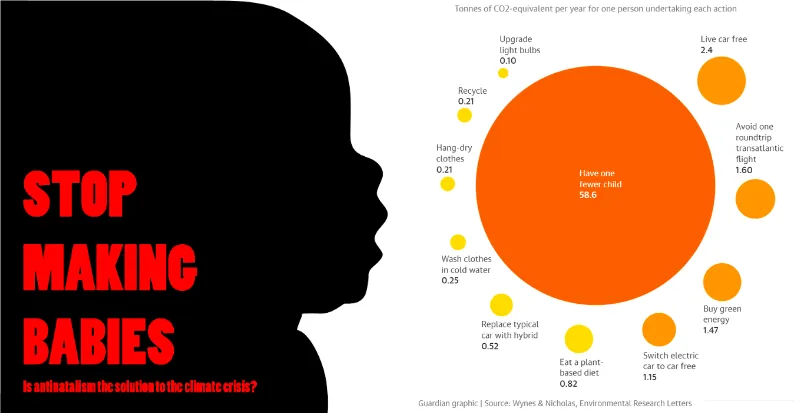Table of Contents
By and large, young people are not allowed to want things anymore. Any display of excess joy, wealth, or status is chastised. Though some of these attacks are fair criticisms of unnecessary decadence, this “anti-entitlement” culture means that any and all desire is shut down. If you flaunt your nice car, nice apartment, nice purse, nice life, you are against the equality of all peoples, insisting instead that we should all be equally deprived of desire for goods—and the goods themselves.
But this attitude has extended far beyond the realm of the material and into the familial: because of climate change, some say, we can no longer want children. Fearmongering from climate-activists about future generations’ lack of survivability in an alleged wasteland must not be a reason that our generation becomes the last.
I’ve heard numerous stories of couples who broke up because one wants children and the other does not. This might seem like a mundane case of incompatibility until the latter explains their reason: "I do not want to bring children into this world." 56% of millennials—the generation currently nearing the end of its child-bearing years—do not want children. I plan on having children. Many of my friends—both men and women—do not.
The pervasiveness of this sentiment is deeply concerning. No industrialized country other than Israel has a replacement-rate fertility (2.1 children per mother). Japan’s 1.3 fertility rate is spurring a fertility crisis which is, in turn, leading to economic crisis and even collapse. Though having children may seem like a burden, it is an obligation men and women alike have to ensure the wellbeing of future generations.
If one believes in an intrinsic value to life—which we all should—fertility rates must be a concern. Though the statistics for Gen Z are currently less frightening than those of Millennials, many in my generation aren’t even legal adults, so full data cannot be furnished. By name alone, there is a subconscious premonition against having children: Z is the last letter of the alphabet—what comes after Gen Z? And why don’t young people want children? Those crying out that the world will end declare that in being Gen Z, we are the last generation.
The strong sense of an eschatalogical ending haunts young people. Children climate activists, largely belonging to Gen Z, stopped going to school to declare that our futures were being stolen from us. Stanford’s own Sophia Kianni spent her teenage years planning and attending climate protests, including those organized by Extinction Rebellion, a group which forces passersby to watch trite, overly-elaborate performance art to draw attention to the (alleged) ongoing sixth mass extinction. The spectacle of the youth climate activists was that they had to artificially stop time for themselves—no prom, study halls, or driver’s licenses—to prevent extinction.
But anti-natalism alarmism is no longer just a problem for a select group of climate activists. In a recent PEW Research study, 5% of childless adults in America—about 760,000 people—cite climate change as a reason they have chosen not to have children. As Gen Z approaches the traditional age of childbearing—hundreds of thousands of adults inundated with alarms of looming extinction will blame the environment on their decision not to have children.
One example of this trend away from child rearing is that San Franciscans have more dogs than children, the city’s residents hoping to fill the void that children leave with a less CO2-rich substitute. Filling the desire to raise children by raising a dog—much less effort than an actual child—and stealing the language used for actual parenthood (e.g. dog mom) is a sad example of anti-natalist laziness. San Francisco’s median age (38.3) is only slightly lower than the national average (38.8), the hyper-individualistic city is but a marker of America’s trajectory as the country leans away from valuing the creation of families. After all, dogs are much lower-emission than humans. As a result, climate change has become a perversely noble cause that liberals adopt to excuse their own laziness and selfishness in their decision not to have children.
The fertility crisis of the climate crisis is only the latest attack on the creation of families. The widespread availability of birth control, condoms, and other forms of sexual protection separate sex from its very real consequences. Having children is a choice for the first time in all of human history—and it looks like many are eschewing the right choice. Any further ideological weapon against the promotion of families should be warned against.
Though scholars speculate as to why women are having fewer children than ever before, none doubt the waning influence of religion, increasing atomization, and careerism among young women. Ironically, the loudest (often leftist) advocates pressuring women not to have children for the climate’s sake are in line with hyper-capitalists who pressure women not to have children for the company’s sake.
No matter what caused the anti-natalist mayhem we are seeing in the industrialized world, we cannot let climate change become another reason that women choose not to have children or people choose not to start families. The ultimate act of care for the human species is having children, not falling for a lazy excuse to degrade the value of life.








